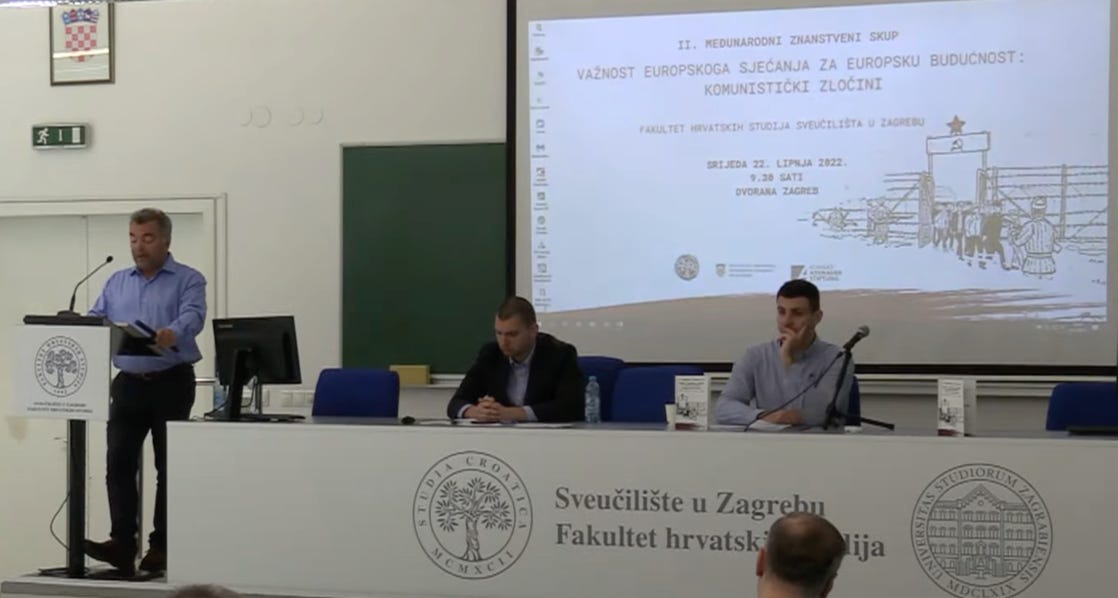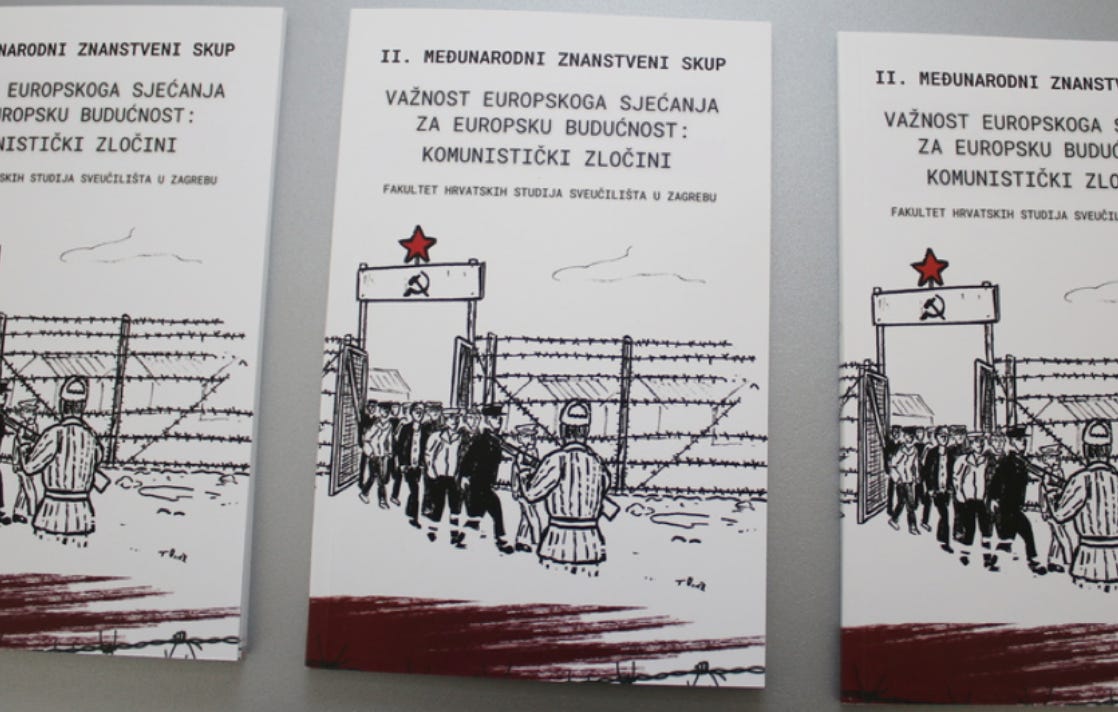Find Out More Information In This Documentary Film
Dr. Dorothy S. McClellan
YUGOSLAV COMMUNIST CRIMES
The Importance of European Memory for the European Future: Communist Crimes
On June 19, 2022, the University of Zagreb’s Faculty of Croatian Studies held an international scientific conference to mark the 75th anniversary of the Bleiburg Tragedy and the Way of the Cross. It is fitting that as the Croatian presidency of the Council of the European Union comes to an end, this event focuses our attention on the civilizational need to deal with and confront the past. Organized by doc. dr. sc. Vlatka Vukelic, doc. dr. sc. Vladimir Šumanović, and mag. Danijel Jurković of the Faculty of Croatian Studies, the conference received additional financial support from the Ministry of Science and Education of the Republic of Croatia and the Konrad Adenauer Foundation of Germany. This conference was a contribution to the faculty’s important activities which center around developing inter-institutional and international scientific cooperation, engaging in scientific dialogue and research, and preparing a new generation of scientifically trained experts who relentlessly delve deeply, honestly, courageously into the historical, political, and cultural experiences of the Republic of Croatia to inform the future of the country, following the data wherever they may lead.
In the seventy-seven years since the end of World War II, and thirty-one years since the establishment of an independent, free, democratic, and sovereign Republic of Croatia, Croatian historians, academics, and scientists have, after thorough review of communist archives, begun to reveal extensive new data confirming and documenting communist crimes. Based on these findings, scholars conclude that they have an obligation to publicly and professionally disseminate this historical knowledge concerning crimes committed during World War II and in the post-war period. This recent conference contributed to that important goal. As the video link to the major presentations reveals, those present had the privilege of hearing from scholars who have accepted the mantle of responsibility for sharing difficult truths with the nation, truths that will most certainly enable Croatia to move forward in building a modern state.
Truths Revealed: Mass Crimes
The first documented mass crimes committed by Tito’s Partisan forces on behalf of the Communist Party of Yugoslavia were recorded during the war years, i.e., from 1941 to 1945. An enormous number of ordinary citizens were identified by the Communist Party of Yugoslavia as permanently undesirable according to various criteria: nationality, property status, political views, and religion. These individuals were subjected to physical torture, humiliation, and liquidation organized and carried out largely en masse without due process, without fundamental human rights. In May 1944, two infamous branches of the Communist Party of Yugoslavia were established to carry out these criminal measures under the name of the Department for the Protection of the People (UDBA), and the Yugoslav National Defense Corps (KNOJ), a special unit of 120,000 of its most loyal Communist Party soldiers. Their main task was to organize interrogations, mass killings, and the looting of property of citizens, i.e., the confiscation of the private property of citizens through so-called “collectivization” measures designed to preserve, plunder, and control the material and natural resources of the Croatian and Slovene people, and to hide the crimes of the communist Yugoslav regime.
Communist ideology and practice held that the achievements of the communist revolution could not be preserved without the “dictatorship of the proletariat,”; which in practice meant the justified use of secret and public police involvement and force that resulted in government supported and condoned barbaric, political crimes against humanity by individuals who to this day remain unnamed and unpunished.

Find Out More Information In This Academic Article
This paper examines the long-term challenges to democratic nation building that have resulted from the forced repatriation of hundreds of thousands of Croatian civilians and military personnel to ...
www.researchgate.net

Through examination of the evidence presented, one begins to understand the enormous scale of the systematic, comprehensive repression, theft, murder, and genocide, crimes carried out by the Yugoslav communist dictatorial regime at the end of the war and in the post-war period. The crimes focused not only on “undesirable” persons but also on institutions, worldviews, values, and symbols. The most severe form of repression was the systematic, mass execution of people without due process, crimes against hundreds of thousands of nameless citizens. The scars of these crimes have left their mark on the Croatian body politic.
Due to long-standing historical circumstances, Croatians were particularly hard hit. The attack on Croatians dates to the creation of the Yugoslav concept in the thought factories of Vienna and Rome. They continued through the Greater Serbia monarchy supported by British imperialism implemented through the Slovenia Croatian Serbian Kingdom, and were later embodied in Tito’s Yugoslavia with the establishment of Marxist ideology as the guiding philosophy of this communist Bolshevik criminal movement. Over the decades, any attempt to form a Croatian national organization dedicated to the creation of a free, sovereign, national Croatian state was punished by physical liquidations. Evidence of this includes the assassination of Stjepan Radić, the leader of the Croatian Peasant Party, the encroachment of Croatian territory by fascist Italy and National Socialist Germany, Serbian fragmentation of Croatian territory, and the displacement and liquidation of the Croatian population.
At the end of World War II approximately half a million Croatian civilians and almost 200,000 Croatian soldiers withdrew across Slovenia to Austria in the faith and hope that the Western Allies would accept them into their security zones and thus protect them from bloodthirsty communist Yugoslav and Serbian criminals seeking revenge. A special type of systematic, mass execution and genocide against the Croatian people was carried out by the Yugoslav regime, without benefit of trials or with accelerated group trials before revolutionary courts, as it occupied certain regions, settlements, towns, and cities. The mechanism for accomplishing this gruesome work was set in place in May 1944, when the infamous branches of the Communist Party of Yugoslavia were founded under the name of the People’s Protection Department (UDBA), as well as the National Defense Corps of Yugoslavia (KNOJ) to carry out mass liquidation, and to hide the crimes of the communist Yugoslav regime.
Beginning in the year 2000, as Croatia moved toward entry in the European Union and due to political reasons related to the transfer of power from a communist to a democratic system, research was mostly suspended or significantly slowed down in Croatia. The same was true in Slovenia beginning in 2007. Therefore, there was no formal, governmental attempt to investigate these horrific crimes or the criminal repression of the Yugoslav communist regime, despite the fact that Croatia and Slovenia’s admission into the European Union requires that they are legally bound to disclose and investigate such matters to qualify for membership. Accordingly, in a pro forma mode, the Croatian Parliament adopted the corresponding Declaration in June 2006, which has remained a dead letter.
It is clear to everyone that the suspension of research was mainly prompted by the results of the archival research from 1991 to 2000. The public waited with great interest for the publication of the results in order to implement the much-desired political and economic lustration of Croatian society, but that did not happen. Another reason for the moratorium on research was the fact that the privatization of “social property” that was forcibly taken from honest private individuals during Tito’s regime would be fully revealed and would require formal restitution and reparations.

All Content © 2015 - 2024 Croatian Film Institute, All Rights Reserved
